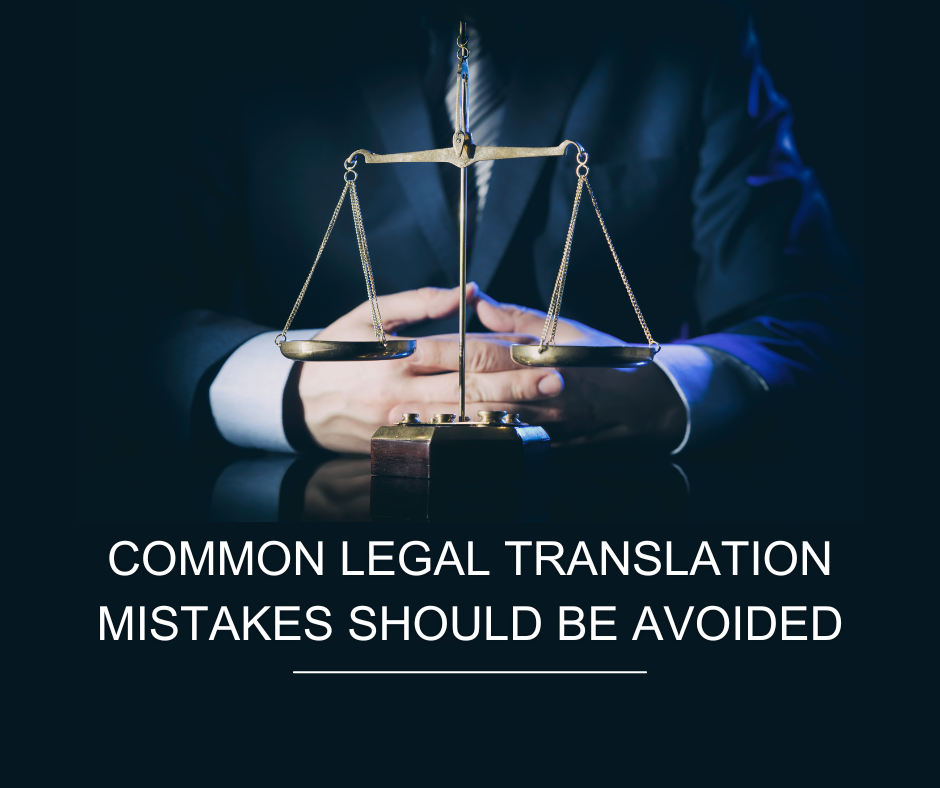Common mistakes in translation: Legal translation is a highly specialized area that demands a profound comprehension of legal terminology and the subtleties inherent in different languages. Accurate legal translation necessitates the expertise of trained professionals who comprehensively understand the legal systems in the source and target languages. Despite the significance of legal translation, it is not uncommon for errors to occur, which can have grave consequences for individuals and organizations alike. In this blog, we will explore some common mistakes in legal translation and provide solutions to avoid them.
Also know: 6 Common Errors in Translation You Need to Avoid
Contents
Common legal translation mistakes should be avoided
Translating legal documents accurately is challenging, and errors can lead to significant misunderstandings or legal complications. Here are some of the common mistakes that can occur during legal translation:
literal translation
One prevalent mistake in legal translation is using literal or word-for-word translation. While this approach may suit specific contexts, it often leads to inaccuracies and misunderstandings in legal documents.
For instance, consider the English phrase “time is of the essence.” This phrase signifies that a deadline or time limit is crucial and must be strictly adhered to within a legal framework. However, if this phrase is translated into another language, it may fail to convey the same meaning.
For instance, the literal translation of “time is of the essence” in Spanish would be “el tiempo es de la esencia,” which does not carry the same legal significance as the English phrase.
To avoid this mistake, translators should research legal terminology in both languages and focus on conveying the intended meaning and capturing the context of the original phrase.
Neglecting cultural differences
Another mistake in legal translation is the failure to account for cultural differences and legal systems. Legal systems and terminology can vary significantly between countries, and a translator must comprehensively understand these differences to translate a legal document accurately.
For example, consider the English legal concept of “contractual capacity,” which refers to an individual’s ability to enter into a legally binding contract.
In some countries, the concept of contractual capacity may be similar to its English counterpart. Still, it may be known by a different term or carry a slightly different meaning in others.
If a translator is unfamiliar with the legal systems and terminology of the target language, they may employ the wrong term or concept, leading to misunderstandings or even legal challenges.
Thus, legal translators must carefully navigate these variations, employing legal expertise and cultural sensitivity to ensure the translated document is accurate and legally valid in the intended jurisdiction.
Using obscure legal terms
Legal documents contain specialized terminology and language; however, all parties must fully comprehend these terms to avoid confusion and misunderstandings.
Thus, translators should avoid using excessive technical jargon or legal terminology without clear explanations.
Clarifying and simplifying complex terms will ensure that all parties have a shared understanding and can proceed accurately and confidently.
Contextual misinterpretation
Failing to grasp the contextual nuances can lead to the misinterpretation of legal clauses or provisions.
This can occur when translators overlook specific circumstances or conditions that impact the meaning of the text.
Translators must meticulously analyze the source document to avoid errors, considering its broader context and intended purpose.
By thoroughly understanding the original content, translators can accurately render it in the target language, capturing the intended meaning and preserving the legal nuances present in the source text.
Omission or addition of information
Neglecting to include essential information or adding extraneous details can significantly alter the document’s intended meaning.
Translators should exercise precision and attentiveness to ensure that all relevant information is faithfully conveyed without omissions or additions.
This requires a comprehensive understanding of the subject matter and the ability to identify crucial details that must be preserved in the translated version.
By meticulously comparing the source and target texts, translators can detect and rectify any discrepancies, ensuring the translated document remains true to the original content and purpose.
Poor formatting
Neglecting the formatting and structure of legal documents can result in confusion or errors.
Legal texts often have specific formatting requirements, such as headings, numbering, and referencing systems, that enhance clarity and facilitate understanding.
Translators should pay close attention to these formatting conventions to maintain the document’s integrity and readability.
By accurately replicating the original document’s structure and layout, translators can ensure that the translated version maintains its professional appearance and enables readers to navigate and comprehend the content seamlessly.
Also know: The role of legal translation in cross-border litigation
Unmatched legal translation service ensuring error-free results with Arkan
In legal translating, every word and every nuance holds immense significance, shaping the outcomes of legal proceedings and important business deals. At Arkan, we understand that precision, confidentiality, and profound legal domain knowledge are non-negotiable. Our team of seasoned translators and legal experts possess an extensive background in law, ensuring that no nuance is lost in translation.
Why choose Arkan?
- We guarantee precise translation of every phrase, clause, and provision, flawlessly preserving the original intent and legal context.
- Arkan’s translators are highly experienced in various legal systems worldwide and are well-versed in specific terminology and conventions.
- With our unwavering commitment to security, we ensure the utmost protection for your sensitive information.
- Arkan operates with unparalleled efficiency, delivering your translated documents promptly and maintaining exceptional quality.
- Our comprehensive services cater to various legal translation needs, from contracts and patents to court documents and legislation.
Whatever your legal translation requirements, we have the expertise to handle them with precision and care. Cooperate with Arkan today to get the best legal translation services.
In conclusion, accurate legal translation is crucial to prevent misunderstandings and legal complications. Therefore, it is important to avoid common mistakes that could compromise the integrity and validity of translated legal documents. One such mistake is relying on literal translations. Moreover, cultural differences and variations in legal systems should be considered.
To achieve this, avoiding excessive technical jargon, grasping contextual nuances, maintaining precision in information, and adhering to proper formatting is essential. By understanding these common mistakes and implementing strategies to avoid them, legal translators can deliver high-quality translations that effectively serve their purpose.
Contact us today and Join thousands of satisfied clients who have successfully navigated international legal waters with our trusted services. Act now and protect your legal interests like never before!




